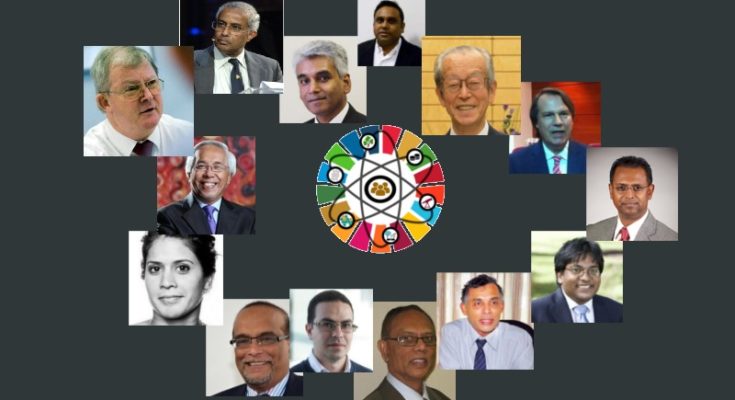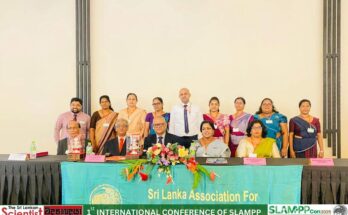Creating History in Sri Lankan science and technology sector the biggest ever Science and Technology Forum the STS Forum 2016 starts today at the Nelum Pokuna Mahinda Rajapaksa Theater. This event will bring together almost all the leading Sri Lankan Scientists and around 100 intentionally recognized scientists from other countries as well.
The forum is expected to discuss the role of Science and Technology in sustainable development, specially using novel technologies and and novel findings in countries development in a more sustainable manner. Apart from that the event will cover other related issues also including citizen science, capacity building, technology and innovation, funding and investment in science and technology, establishment of a Sri Lankan Innovation Platform and nanotechnology.
The opening ceremony tomorrow will be held with the participation of Mr Ranil Wickremesinghe, Hon. Prime Minister of the Democratic Socialist Republic of Sri Lanka and His Excellency Maithripala Sirisena, President of the Democratic Socialist Republic of Sri Lanka. Prof. Michael J Kelly from University of Cambridge will deliver the keynote address.
The Forum with five plenary sessions and four Breakout Sessions will be held between 8 and 10 September at Waters Edge, Colombo with the participation of the scientists and countries’ decision makers.
Listed below are some of the resource personnel attending the forum.
Prof. Michael Kelly (physicist)
Professor Michael Kelly is the Prince Philip Professor of Technology in the University of Cambridge since 2002, and a Professorial Fellow at Trinity Hall. Since 2006 he has been a Non-executive Director of the Laird plc.
Prof. Zakri Abdul Hamid
ZAKRI Abdul Hamid (born 23 June 1948) has had a distinguished career in science as a researcher, educator, administrator and diplomat.
Awarded the federal honorific title “Tan Sri” by Malaysia’s head of state in 2014, he serves today as the founding Chair at the Intergovernmental Science-Policy Platform on Biodiversity and Ecosystem Services (IPBES), as the Science Advisor to Malaysia’s Prime Minister, and as one of 26 members of the UN Secretary-General’s Scientific Advisory Board.
Kōji Omi
Founder and Chairman, Science and Technology in Society Forum of Japan and the former minister of Finance in Japan
Prof. I.M. Dharmadasa
I.M. Dharmadasa is Professor of Applied Physics and leads the Electronic Materials and Solar Energy (solar cells and other Semiconductor Devices) Group at Sheffield Hallam University(SHU), UK. Dharme has worked in semiconductor research since becoming a PhD student at Durham University as a Commonwealth Scholar in 1977, under the supervision of the late Sir Gareth Roberts. His interest in the electrodeposition of thin film solar cells grew when he joined the Apollo Project at BP Solar in 1988. He continued this area of research on joining Sheffield Hallam University in 1990.
He has published over 200 refereed & conference papers, has 6 GB patents on Thin Film Solar cells and has made over 175 conference presentations. He has made 5 book contributions and is the author of the book Advances in Thin Film Solar cells, which was released in 2012. IMD has also successfully supervised 20 PhD and MPhil candidates and 14 years of PDRA support. He has gained research council and international government funding, and was included in the 2001 Research Assessment Exercise (RAE) for Metallurgy and Materials which gained the top rating of five.
Dr. Asha de Vos
Asha de Vos is a marine biologist and TED Fellow who specializes in researching and working with marine mammals. She has degrees from the Universities of St. Andrews and Oxford, and her PhD from the University of Western Australia. She oversees the Sri Lankan Blue Whale Project, the first long-term study on blue whales within the northern Indian Ocean.
A Duke University Global Fellow in Marine Conservation, de Vos previously worked at the International Union for the Conservation of Nature while she has also consulted with the National Aquatic Research Agency. She was a panelist at the Rio+20 summit in Rio de Janeiro in 2012.
Aruna Weerasooriya
Prof Aruna Weerasooriya is another Sri Lankan Scientist who is an expert in Plant Systematics and Medicinal Plants, currently he is a Research Scientist at PVAMU (Texas A&M University System).
Prof. Shantha Liyanage
Dr Shantha Liyanage is a research coordinator at the Department of Education and a professorial fellow of the University of Technology Sydney. He held senior academic positions as the Associate Professor and Director of Technology Management Centre of the University of Queensland where he developed innovative eLearning postgraduate programs in technology and innovation management. He joined the University of Auckland New Zealand and contributed to disciplines of leadership, innovation and entrepreneurial research and teaching.
He conducted leadership and organisational management research with the ATLAS team of CERN, Geneva and published books and papers. He completed numerous consultancy assignments for various Governments, International development Agencies such as the Asian Development Bank, the World Bank, UNESCO, SIDA/SAREC, UNIDO and AusAid. He is the editor-in-chief of the International Journal of Leaning and Change, Inderscience, UK.
Prof. Ravi Silva
Prof. Ravi Silva is the Director of the Advanced Technology Institute (ATI) and Heads theNano-Electronics Centre (NEC), which is an interdisciplinary research activity. Ravi’s secondary education was in Sri Lanka, after which he joined the Engineering Department at Cambridge University for his undergraduate and postgraduate work. He was a recipient of Cambridge Commonwealth Trust Fellowship while at Cambridge and member of Clare College.
In 2002 he was awarded the Charles Vernon Boys Medal by the Institute of Physics, and in 2003 he was awarded the IEE Achievement Award. In 2003 he was also awarded the Albert Einstein Silver Medal and Javed Husain Prize by UNESCO for contributions to electronic devices. In 2003 the largest EPSRC Portfolio award for £6.68M was awarded to Prof. Silva and his team on Integrated Electronics which examined nanoscale design featrues on the optical and photonic device properties. In 2004 by a SRIF award for £4M to set up a Nano-Electronics Centre for multidisciplinary research was awarded and allowed the enhancement of nano-bio activities via the EU Sensation and EU Carbio programme. In 2005, the Nano-Electronics Centre was a finalist in the Emerging Technologies category of the IEE 2005.
Prof. Stergios Logothetidis
Stergios Logothetidis is a Greekphysicist and a full time professor at the solid-state physics department of Aristotle University of Thessaloniki. He is the founder and director of the Lab for Thin Films – Nanosystems and Nanometrology (LTFN). His scientific and research activities are focused on the areas of: nanotechnology, organic electronics, nanomedicine, nano-bioelectronics and thin films.
Dr. Thusitha Sugathapala
Dr Thusitha Sugathapala is a Senior Lecturer in Mechanical Engineering of the University of Moratuwa and presently working as the Director General of Sri Lanka Sustainable Energy Authority (SLSEA), Ministry of Environment and Renewable Energy in Sri Lanka. He is a Chartered Engineer and Member of the Institute of Engineers in Sri Lanka. He obtained the BSc Engineering Honours Degree specialized in Mechanical Engineering from University of Moratuwa and PhD in the area of Fluid Dynamics from University of Cambridge, UK. He served as the Head of the Department of Mechanical Engineering from 2005 to 2008.
Dr. Sugathapala’s research areas of interest cover both energy and environment fields, including renewable energy resources and technologies, especially biomass and wind; energy conservation in fluid machinery, air quality management, especially on indoor air pollution and air emission control (from both stationary and mobile sources).
Dr Fernando Castro
Dr Fernando Castro leads research on solar photovoltaics and organic electronics at the National Physical Laboratory (UK). Current work focuses on innovative metrology to support materials and product development in three broad areas: performance (from nano- to macroscale), durability and large-area characterisation.
Prof.Manish Chhowalla
Manish Chhowalla is a Professor, Associate Chair of the Materials Science and Engineering Department, and the Director of the Institute for Advanced Materials,Devices and Nanotechnology at Rutgers University. From June 2009 – July 2010, he was a Professor in the Department of Materials at Imperial College London. Before Rutgers,he was a Royal Academy of Engineering Postdoctoral Research Fellow at the University of Cambridge after completing his Ph.D. in Electrical Engineering there. Prior to his PhD, he worked for Multi-Arc Inc. (now Ion Bond) where he developed one of the first applications of “amorphous diamond” thin films. He is a Fellow of the Royal Society of Chemistry and Institute of Physics. He is also the Editor in Chief of Applied Materials Today. His current interests are in the fundamental studies of 2D materials.
Dr. Bandula Wijay
Dr. Bandula Wijay is a scientist, engineer, and inventor, and has invented over 20 medical devices. He is named the inventor on over 20 U.S. and international patents. Dr. Wijay developed, patented, and sold a number of products, nationally and internationally, which are currently used primarily in cardiology/radiology. His patented catheter for percutaneous transluminal angioplasty (PCTA) is currently used in many cardiovascular procedures throughout the world. In addition, his stent invention, which is licensed to Boston Scientific Corporation, is one of the most widely used stents in cardiovascular interventions.
Prof. Gehan Amaratunga
Professor Gehan Amaratunga is the Group Leader of the Electronics, Power and Energy Conversion (EPEC) Research Group, Electrical Engineering Division, Cambridge University Engineering Department. He is also a Fellow of Churchill College, Cambridge.
Professor Amaratunga’s research is in the broad area of materials and technologies for electrical energy and power. It intersects electrical and electronic engineering with chemistry, physics, materials science and information systems.
Prof. Visakan Kadirkamanathan
Visakan Kadirkamanathan is a Professor of Signal and Information Processing at the Department of Automatic Control and Systems Engineering at the University of Sheffield, United Kingdom. Kadirkamanathan was born in Jaffna, Sri Lanka. He completed his school education in Jaffna before moving to the United Kingdom to pursue an engineering education.
He is the Director of the Rolls-Royce supported University Technology Centre in Control and Monitoring Systems Engineering and is a Founding Member of the University Centre for Signal Processing and Complex Systems. From April 2009 to August 2014, he was Head of the Department of Automatic Control and Systems Engineering. He is known for his contribution to the field of statistical signal processing applied to system identification, signal estimation, and fault detection. Kadirkamanathan is the Co-editor of International Journal of Systems Science.




 SAHASAK NIMAVUM 2025: Sri Lanka’s Premier Innovation Showcase Returns This April!
SAHASAK NIMAVUM 2025: Sri Lanka’s Premier Innovation Showcase Returns This April! 
